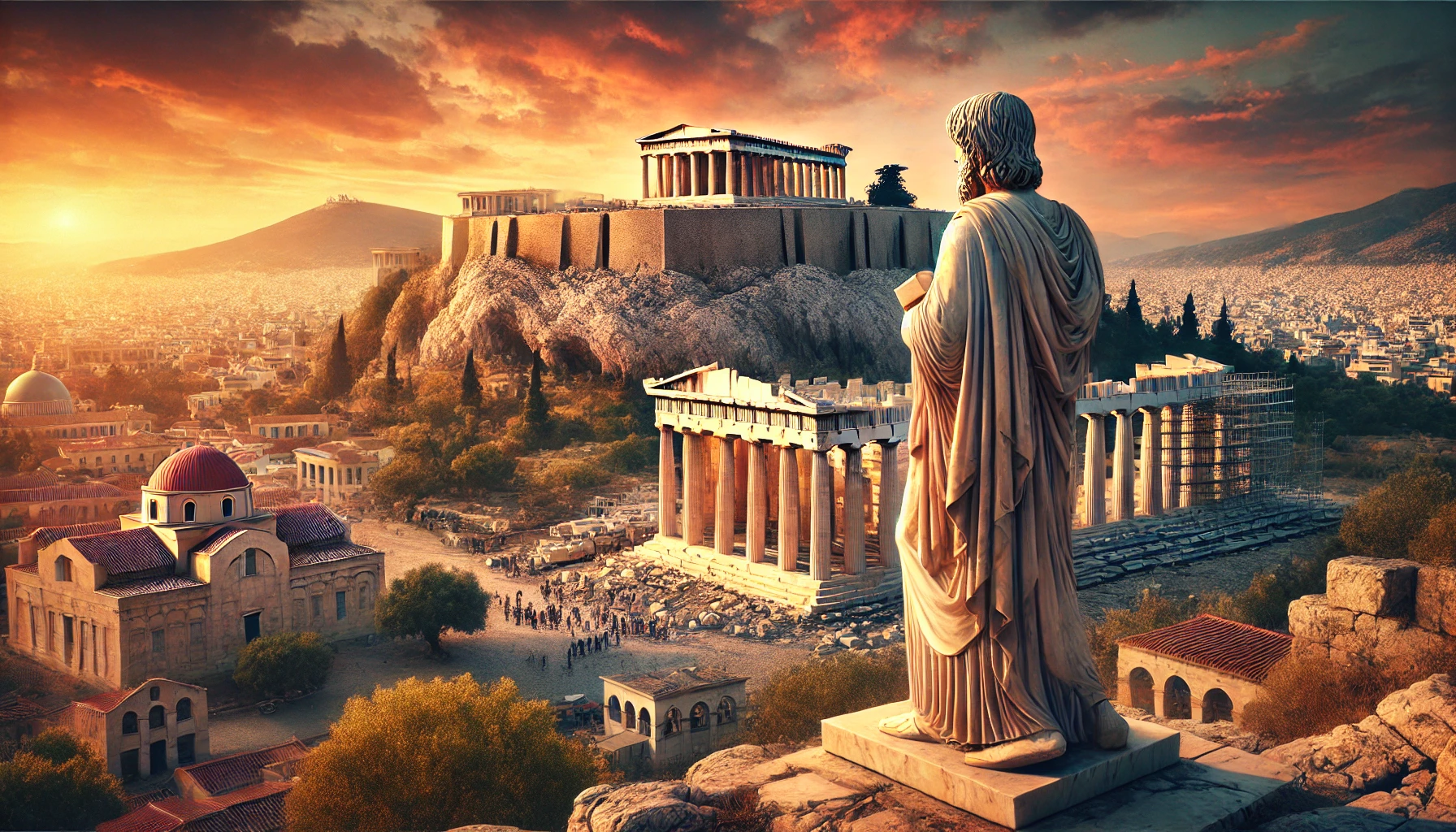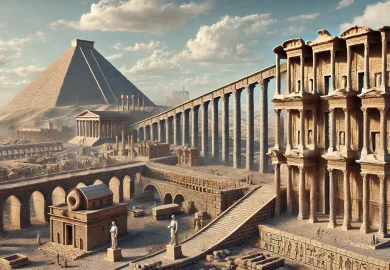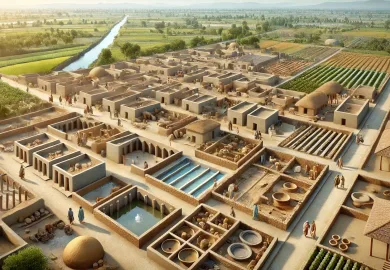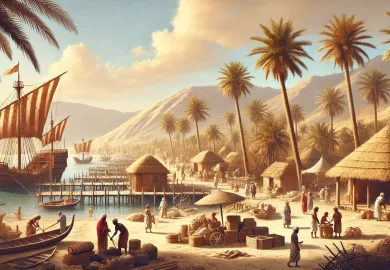
Disclaimer: This content was generated using AI. While I strive for accuracy, I encourage readers to verify important information. I use AI-generated content to increase efficiencies and to provide certain insights, but it may not reflect human expertise or opinions.
The story of Ancient Greece is one of the most fascinating and enduring tales in human history. Spanning from 1100 B.C. to A.D. 140, this civilization laid the foundations for much of Western culture as we know it today. From the grandeur of the Parthenon to the wisdom of philosophers like Socrates, Plato, and Aristotle, Ancient Greece’s contributions to art, politics, philosophy, and science continue to influence the modern world. The ancient Greeks not only shaped the physical world with their architectural marvels but also crafted a cultural legacy that has persisted for millennia.
The Dawn of Greek Civilization: The Dark Ages and the Archaic Period
The history of Ancient Greece begins with the period known as the Greek Dark Ages, which lasted from around 1100 B.C. to 800 B.C. This era followed the fall of the Mycenaean civilization and was marked by a significant decline in population, literacy, and urbanization. Despite these challenges, it was a time of transformation and regeneration, where the seeds of Greek culture were sown.
The Dark Ages gradually gave way to the Archaic Period (c. 800 B.C. to 480 B.C.), a time of significant cultural and political development. The Greeks began to form city-states, or poleis, each with its own government, laws, and customs. This period saw the rise of powerful cities such as Athens, Sparta, and Corinth, which would later play pivotal roles in Greek history.
Art and literature began to flourish during the Archaic Period. The epic poems of Homer, “The Iliad” and “The Odyssey,” were composed during this time, providing a mythological foundation for Greek identity and values. The Greeks also began to develop their distinctive style of pottery, characterized by geometric patterns and later by more naturalistic depictions of humans and animals.
The Classical Era: The Golden Age of Greece
The Classical Period (c. 480 B.C. to 323 B.C.) is often considered the golden age of Ancient Greece. This era was marked by unprecedented advancements in art, philosophy, and politics. The city-state of Athens, in particular, became the epicenter of Greek culture and intellectual life.
One of the most significant developments of the Classical Period was the establishment of democracy in Athens. Under the leadership of figures like Cleisthenes and Pericles, Athenian democracy allowed citizens to participate directly in the decision-making process. This political innovation laid the groundwork for modern democratic systems and remains one of Ancient Greece’s most enduring contributions to the world.
The Classical Era was also a time of great artistic achievement. Sculptors like Phidias and Polykleitos created works of art that exemplified the Greek ideals of balance, harmony, and proportion. The Parthenon, built on the Acropolis of Athens, stands as a testament to the architectural and artistic brilliance of this period. It was not just a place of worship but also a symbol of the power and cultural superiority of Athens.
Philosophy flourished during the Classical Period, with figures like Socrates, Plato, and Aristotle making profound contributions to Western thought. Socrates developed the Socratic method, a form of inquiry that remains a fundamental part of philosophical and scientific discourse. Plato, a student of Socrates, founded the Academy and wrote dialogues that explored justice, ethics, and the nature of reality. Aristotle, Plato’s student, made groundbreaking contributions to logic, metaphysics, biology, and ethics, and his works became the foundation of Western intellectual tradition.
Hellenistic Greece: The Spread of Greek Culture
Following the death of Alexander the Great in 323 B.C., the Hellenistic Period (c. 323 B.C. to 31 B.C.) began. This era was characterized by the spread of Greek culture across a vast empire that stretched from Greece to Egypt and as far east as India. The conquests of Alexander and his successors helped to disseminate Greek language, art, and ideas throughout the known world.
The Hellenistic Period saw the fusion of Greek culture with those of the conquered regions, resulting in a rich and diverse cultural landscape. Cities like Alexandria in Egypt and Pergamum in Asia Minor became centers of learning and culture, attracting scholars, artists, and philosophers from across the Mediterranean and beyond.
In the realm of art, the Hellenistic Period was marked by increased emotional expression and dynamic movement in sculpture. Artists like Lysippos and Praxiteles broke away from the idealized forms of the Classical Period, creating more naturalistic and individualized representations of the human form. The famous statue of the Venus de Milo, with its sensual beauty and lifelike drapery, exemplifies the artistic achievements of this period.
Philosophy also evolved during the Hellenistic Period, with the emergence of new schools of thought such as Stoicism, Epicureanism, and Skepticism. These philosophies offered different paths to achieving happiness and understanding the world, reflecting the diverse and cosmopolitan nature of Hellenistic society.
Roman Greece: The Enduring Influence of Greek Culture
The final chapter of Ancient Greek history is often referred to as Roman Greece, which began in 146 B.C. when Greece became a province of the Roman Republic. Despite the loss of political independence, Greek culture continued to thrive and exert a profound influence on Roman civilization.
The Romans were greatly influenced by Greek art, literature, and philosophy. They admired Greek culture and sought to emulate it in many ways, often bringing Greek artists and intellectuals to Rome. Greek became the language of the educated elite in Rome, and many Roman nobles sent their children to Greece to be educated.
Roman architecture was heavily inspired by Greek models, with the use of columns, pediments, and friezes becoming standard in Roman buildings. The Romans also adopted and adapted Greek myths, gods, and religious practices, integrating them into their own cultural and religious framework.
The legacy of Ancient Greece continued to shape the Roman Empire, and through the Romans, it was transmitted to later European cultures. The Renaissance, in particular, saw a revival of interest in Greek art, philosophy, and science, leading to a renewed appreciation of the achievements of Ancient Greece.
Conclusion: The Timeless Legacy of Ancient Greece
The history of Ancient Greece is a testament to the enduring power of culture, art, and ideas. From the early days of the Dark Ages to the heights of the Classical Period and the cosmopolitanism of the Hellenistic Era, Greek civilization has left an indelible mark on the world. Even as Greece fell under Roman rule, its culture continued to influence and inspire, laying the foundations for Western civilization as we know it today.
The achievements of Ancient Greece in politics, philosophy, art, and science continue to resonate in modern society. The democratic ideals of Athens, the philosophical inquiries of Socrates, Plato, and Aristotle, and the artistic brilliance of Greek sculptors and architects have shaped the way we think, govern, and create. As we look back on the history of Ancient Greece, we are reminded of the timelessness of its contributions and the lasting impact of its legacy on the world.








